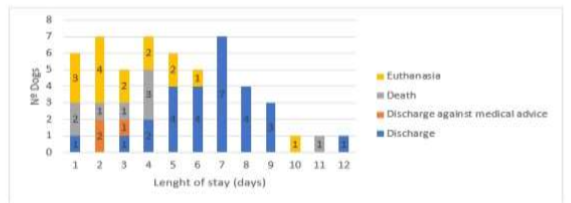Characterization of Acute Infections by Leptospira Spp. in 53 Dogs Admitted to a Biological Isolation and Containment Unit
Abstract
Leptospirosis is caused by spirochetes of the genus Leptospira spp., responsible for a serious systemic infection. A retrospective study was performed to identify risk factors, prognostic indicators and variables affecting the length of stay in acutely infected dogs with Leptospira spp, admitted to the Biological Containment and Isolation Unit of the Veterinary Teaching Hospital, Faculty of Veterinary Medicine, University of Lisbon.
Leptospirosis was confirmed through IgM serology in 53 dogs with clinical suspicion. Risk factors associated with the occurrence of acute leptospirosis were the dog’s age group and winter. Being neutered females, dogs over 8 years old and summer were protective factors. There was a worse prognosis in hypothermic dogs, oligoanuric and with increased urea and/or high creatinine levels. The presence of neutrophilia significantly affected the length of stay.
Leptospirosis is one of the leading infectious causes for dogs’ hospitalization with acute presentations often fatal. Yet 52.0% of the infected dogs were unvaccinated and 24.0% had the leptospirosis vaccination overdue. Vaccination compliance, early diagnosis and prompt treatment are critical. It´s a “One Health” threat and effective prevention programs are necessary to reduce the burden of this neglected disease, linking public health, animal health and environmental health.







